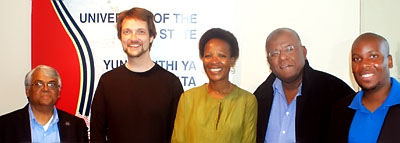Latest News Archive
Please select Category, Year, and then Month to display items
30 May 2025
|
Story Prof Mikateko Mathebula
|
Photo Supplied
 Pictured (from left to right): Prof Faith Mkwananzi, Dr Kapambwe Mwelwa, Prof Lochner Marais, Prof Chikumbutso Manthalu, and Prof Mikateko Mathebula.
Pictured (from left to right): Prof Faith Mkwananzi, Dr Kapambwe Mwelwa, Prof Lochner Marais, Prof Chikumbutso Manthalu, and Prof Mikateko Mathebula.
Through collaborative agreements with the University of Malawi and the University of Zambia, the University of the Free State (UFS) has established the Research Alliance for Higher Education in Africa (RAHEdA), a dynamic initiative aimed at enhancing research capacity and partnerships within Sub-Saharan Africa.
The collaborative agreements align with the UFS’s Vision 130 strategy in relation to internationalisation, emphasising the important role that intra-African mobility visits play in establishing relationships with universities on the continent. It also fosters knowledge exchange and engagement and allows for careful planning and strategy meetings.
“During these discussions, an ambitious but feasible roadmap was laid out for the next three to five years,” Prof Mkwananzi said. “These activities include online workshops for staff and postgraduate students at all partner institutions, and a new webinar series that focuses on profiling, advancing, and celebrating thought leaders, higher education scholars, and scholarship in Africa.”
The inaugural webinar was held on 21 May 2025. Speaker Prof Siseko Kumalo, Associate Professor at the University of Johannesburg’s Ali Mazrui Centre for Higher Education Studies, spoke on ‘Orality as the Bulwark of the Humanities?’, set the bar high for the webinar series through his compelling and original response to this timely question, as scholars around the world contemplate appropriate responses to the rise and influence of artificial intelligence in higher education teaching, learning, and assessment.
Funding to support RAHEdA has been generously provided by Prof Melanie Walker, Distinguished Professor and SARChI Chair in Higher Education and Human Development.
• For information on how to get involved and for updates on RAHEdA, please contact Prof Mikateko Mathebula at MathebulaM@ufs.ac.za
New York academic pays visit to UFS
2010-08-02
 |
Prof. Teboho Moja, a professor of Higher Education at NYU, paid a successful visit to the UFS. Here are, from left: Mr John Samuel, Interim Director: International Institute for Studies in Race, Reconciliation and Social Justice, UFS; Dr Bryan Urbsaitis, Assistant-Director of Study Abroad, Pace University, USA; Prof. Moja; Prof. Jonathan Jansen, Rector and Vice-Chancellor, UFS; and Dr Olihile Sebolai, Directorate Research Development, UFS.
Photo: Arthur Johnson
|
|
Prof. Teboho Moja, a professor of Higher Education from New York University (NYU), paid a fruitful visit to the University of the Free State (UFS). During her visit Prof. Moja, who is originally from South Africa, engaged with various stakeholders to further strengthen relations between the UFS and NYU.
Prof. Moja’s research focus is on the change in higher education and the implications of globalisation on higher education systems. As part of her visit to the UFS, Prof. Moja delivered a public lecture, entitled “Diversity oriented transformation for Teaching and Learning”. The lecture was presented by the Directorate Research Development and the International Institute for Studies in Race, Reconciliation and Social Justice.
Prof. Moja studied at the University of the Witwatersrand and obtained her Doctorate in Philosophy at the University of Wisconsin-Madison in the United States of America (USA).
In 1998 she became the first black woman to be appointed as chairperson of the council of the University of South Africa (UNISA). She is also an honorary professor at the University of Pretoria (UP).
On her visit to the UFS Prof. Moja was accompanied by Dr Bryan Urbsaitis from Pace University in New York and Ms Gina Canterucci from NYU. She also led a group of postgraduate students in International Education Studies. These students interacted with fellows from the Grow Our Own Timber Programme of the UFS. The interaction greatly contributed towards enhancing both student groups’ acuity on academic and social matters.
|